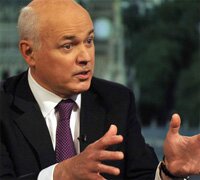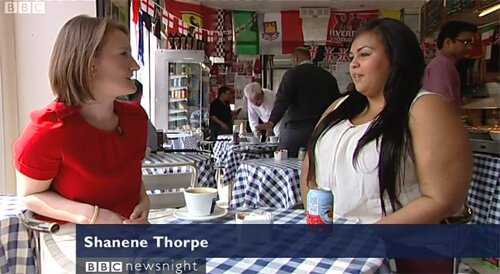Election debates: the trouble with the new consensus
3:30 pm - December 22nd 2009
| Tweet | Share on Tumblr |
Serious political debate – in the sense of well-argued clashes between sharply opposing viewpoints – has been on the decline in this country since it was stifled by ideological consensus at some point in the 1980s.
The key problem is that once all sides share all the same essential premises, it becomes increasingly harder to achieve product differentiation. The rhetoric becomes ever more consensual, because underlying political anger cannot any longer be sustained.
So ignore the hype surrounding the three promised Brown/Cameron/Clegg talking heads shows coming to all major networks next year. Not only are the programmes unlikely to galvanise public interest in the electoral process, they may ultimately benefit the parties that like to present themselves as the radical alternative to the establishment.
It is a cliché of current punditry that Labour has bought into the Thatcherite settlement on free markets, while the Tories have adopted centre-left positions on social issues and on private morality, and the Lib Dems seek out distinctive niches in this broadly centre-right ecosphere.
At the level of values, there is a lot in that generalisation. That is not to say that there are not differences of substance, especially in the crucial field of macroeconomics. For instance, Brown has fought the recession by deploying Keynesianism for the wealthy, stripped of any social democratic content.
While such measures get few socialist pulses racing, they remain preferable to anything the Old Etonians are likely to come up with. Watch what will happen to GDP once the wingnuts return to the Treasury, and you will soon find yourself nostalgic for good old 0.2% a quarter falls.
The trouble is, party leaders cannot use the forthcoming head to heads to discuss the economy in terms that will be intelligible to only a small proportion of the population. Instead, everything will boil down to a Dutch auction on who cuts what, and by how much.
Once, politicians in this country sought electoral backing on the basis of how many jobs they were going to create and how much they planned to boost public services. It is a clear sign of just how far extremist free market ideas have gained intellectual ascendancy that the three main party leaders will be slugging it out in terms of how hard they intend to wield the axe. How do you want your progressive austerity, love? Fried or boiled?
On every issue of consequence – from the European Union to nuclear weapons, from the environment to immigration, the disagreements are those of degree rather than principle, and the likelihood is that this will not go unnoticed out there in Viewerland. Consensus politics means one thing in Westminster, and quite another in Workington.
OK, I’m a North London middle class leftie. What do I know? If I could somehow be teleported into a sitting room in Rochdale, I might find myself pleasantly surprised at just how well somebody who has just lost their job at the callcentre accepts the logic that the interests of the City must come first at all times.
There might be surprising reservoirs of heartfelt support out there for the Lisbon Treaty, which has doubtlessly been dissected in terms of both positive and negative aspects in workies’ clubs across the land, and endorsed so overwhelmingly that a referendum is deemed superfluous.
But my suspicion is that there are large numbers of issues that find the great unwashed not yet with the programme. If the debates boil down to a 90-minute Brown, Cameron and Clegg agree-a-thon, they will be more willing to consider the other options on the ballot paper.
The left is in no position to offer a credible electoral alternative. That will offer an obvious opening for political forces who can convincingly talk in terms of populist solutions and readymade scapegoats. In one sense, the British National Party and UKIP will be on the platform, even if they are not.
| Tweet | Share on Tumblr |  |
Dave Osler is a regular contributor. He is a British journalist and author, ex-punk and ex-Trot. Also at: Dave's Part
· Other posts by Dave Osler
Story Filed Under: Blog
Sorry, the comment form is closed at this time.
Reader comments
I think these debates are an appalling idea.
First, they are little more than a gimmick which serves to test the slickness of the leader. I find it impossible to believe that they are going to be “debates” in any substantive sense.
Second, they are an illegitimate entrenchment of the three “main” parties. Of course they love shaping our political system such that it shuts out other voices. I am sure Labour and the Conservatives are rubbing their hands at the prospect of yet another opportunity to make people think there is nothing more to democracy than rubber stamping the policies of one of the main parties. And I doubt it has even crossed the minds of the Liberal Democrats to boycott such debates on principle. Doubtless Clegg is salivating at being able to play with the big boys.
The media of course are practically wetting themselves over the whole idea, since they like nothing more than something to chatter inanely about.
As far as I am concerned this is an attempt to put another nice veneer on our creaking democracy so that the political establishment can go on ignoring the real reforms that we need.
Yes, I agree that these debates are likely to benefit only the hard Right. But of course Dave pulls his punches as to why Labour bought into the “Anglo-American model of capitalism”. At one level it was because the election results of 1983 and (even more, as I remember it) 1987 convinced personally ambitious Party members that there were far more voters to the right of what had hitherto been taken for the centre than there were on the left of it.
We have analysed why, at a deeper structural level, that was so almost to death here, both in posts and in comments to those posts. And we have come up with absolutely nothing in terms of a strategy. Not the glimmer of an agreement as to what a 21st century “left” party would look like. We are supine in the face of the juggernaut of the global market-place and its corollary, the global labour market – in which perhaps 1% or 2% tops of Brits are competitive. We haven’t a clue how to deal with the issue of race as a source of political cleavage – both integration and separatism belong firmly to the discourse of the right, and indeed the political independence of first-world electorates is, from any honest left perspective, at the heart of the problem. Even the Kleins and the Monbiots can’t bring themselves to praise the behaviour of African leaders at the recent global summit.
The only conclusion I can reach is that this site has failed. It allows for more or less onanistic debate but has produced not one single notion as to how the various forms of inegalitarian politics are to be contested, let alone overcome.
Sunny can refuse to accept my resignation from LC, but it hardly matters what he or I do: we are both dead men walking when it comes to political effectiveness. Politics will continue – it always does – but increasingly those of us who consider equality the end and socialism the means will see the politics of the next few decades as a dreary combat between various equally repulsive stripes of selfishness.
“it was stifled by ideological consensus at some point in the 1980s.”
Personally, I was surprised to learn that there was an ideological consensus in the 1980s.
When did this happen? Presumably after Labour’s manifesto for the 1983 election which committed an incoming Labour government to unilateral nuclear disarmament, withdrawing from the European Common Market and taking the commanding heights of the economy into public ownership.
I acknowledge the Blairite conversion to the Anglo-Saxon model for capitalism but doubt that many of those who voted for New Labour in 1997 fully appreciated that was what they were going to get.
I think it’ll be we Greens who benefit: those posters where the three main parties all look the same will rarely have been so effective. Much of the progressive spectrum will be made painfully aware how poor quality the Labour and Lib Dem approaches are as a response to the economic and environmental crises we face, and we’re the natural home for these people.
I have serious misgivings about these debates. For one thing we don’t elect a prime minister, we elect a Parliament. Politics should be little skirmishes in constituencies, not what the big parties leaders think or argue. The election is held in every mainland seat in the Country and the big three will have candidates in every seat. However many of their opponents will have no opportunity to debate on the TV with these people. Brown, Cameron and Clegg will have candidates in Scotland, but the SNP will have to sit on the sidelines. How can that be fair? How can you have an election with three candidates get to argue their points, but the fourth of fifth candidates get no time to make their case and debate with the leadership of the established Parties?
Yes, but what happened to this fucking consensus between the three wings of the Tory party?
Right to buy- led to a shortage of council housing and youngsters being unable to afford property or do anything other than live with their parents, which we would have laughed our heads off when I left home in 1978.
Doing everything possible to please banker scum- led to reliance on essentially pointless sectors of the economy, which could never sustain themselves, and the myth of whose infallibility has been shattered.
Service “industries” replacing manufacturing- always a lie and now proven beyond all doubt.
Those who sneered at me at the time are eating their words now. I voted for Foot in 1983 and I’d do it again if someone like him stood. I voted NO2EU at the Euro elections, having boycotted elections for years before that in protest at the “candidates”‘ unanimous acceptance of Thatcherism.
Reactions: Twitter, blogs
-
Philip M
RT @libcon: :: Election debates: the trouble with the new consensus http://bit.ly/7uDzAT
-
Jae Kay
RT @libcon: :: Election debates: the trouble with the new consensus http://bit.ly/7uDzAT
-
Liberal Conspiracy
:: Election debates: the trouble with the new consensus http://bit.ly/7uDzAT
-
Quotes of The Week That Was – December 21, 2009 « OutofRange.net
[...] to the Treasury, and you will soon find yourself nostalgic for good old 0.2% a quarter falls. Dave Osler, Libral Conspiracy. If he knew he couldn’t actually deliver on the policy, why make pledges in such concrete [...]
Sorry, the comment form is closed at this time.
NEWS ARTICLES ARCHIVE






















